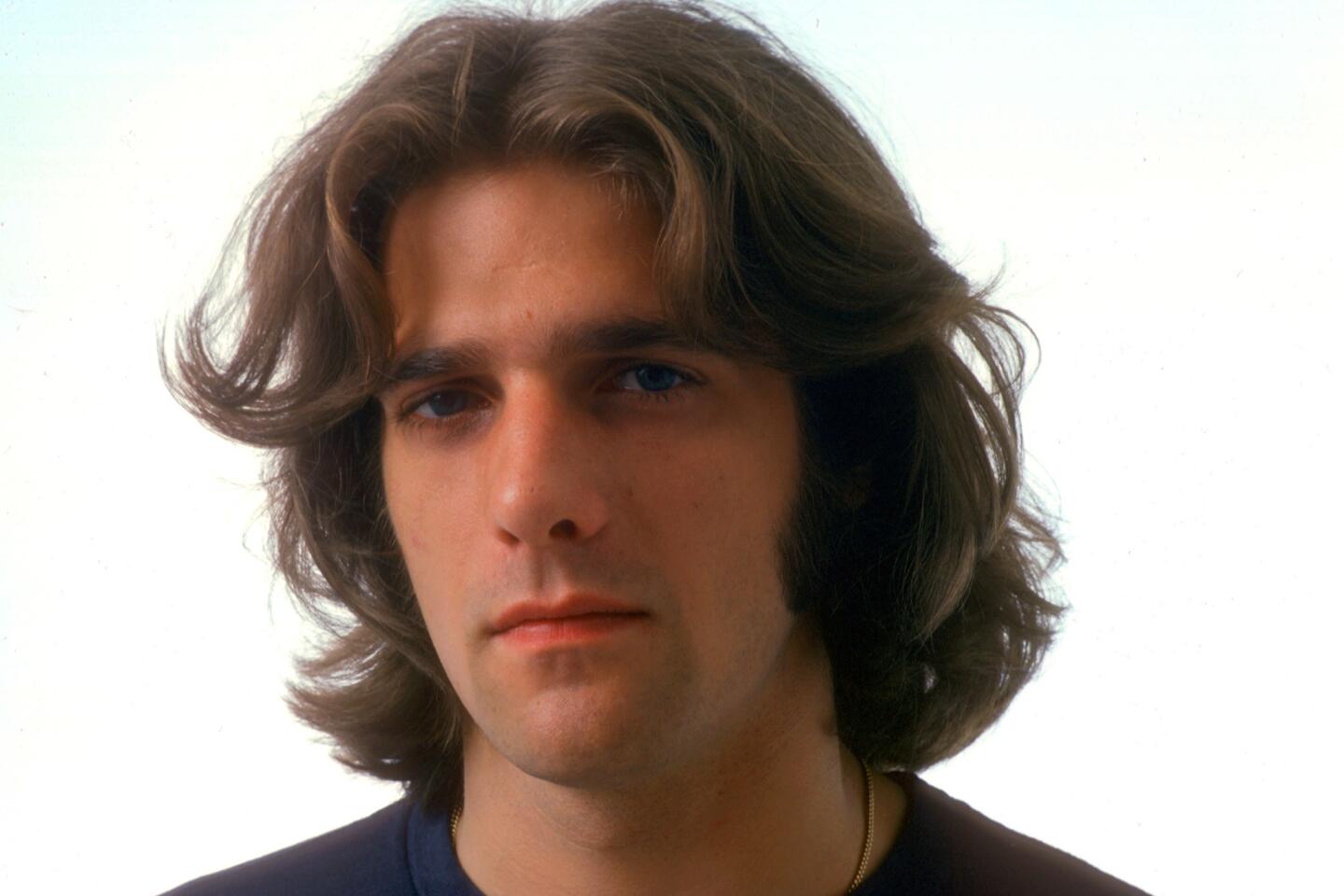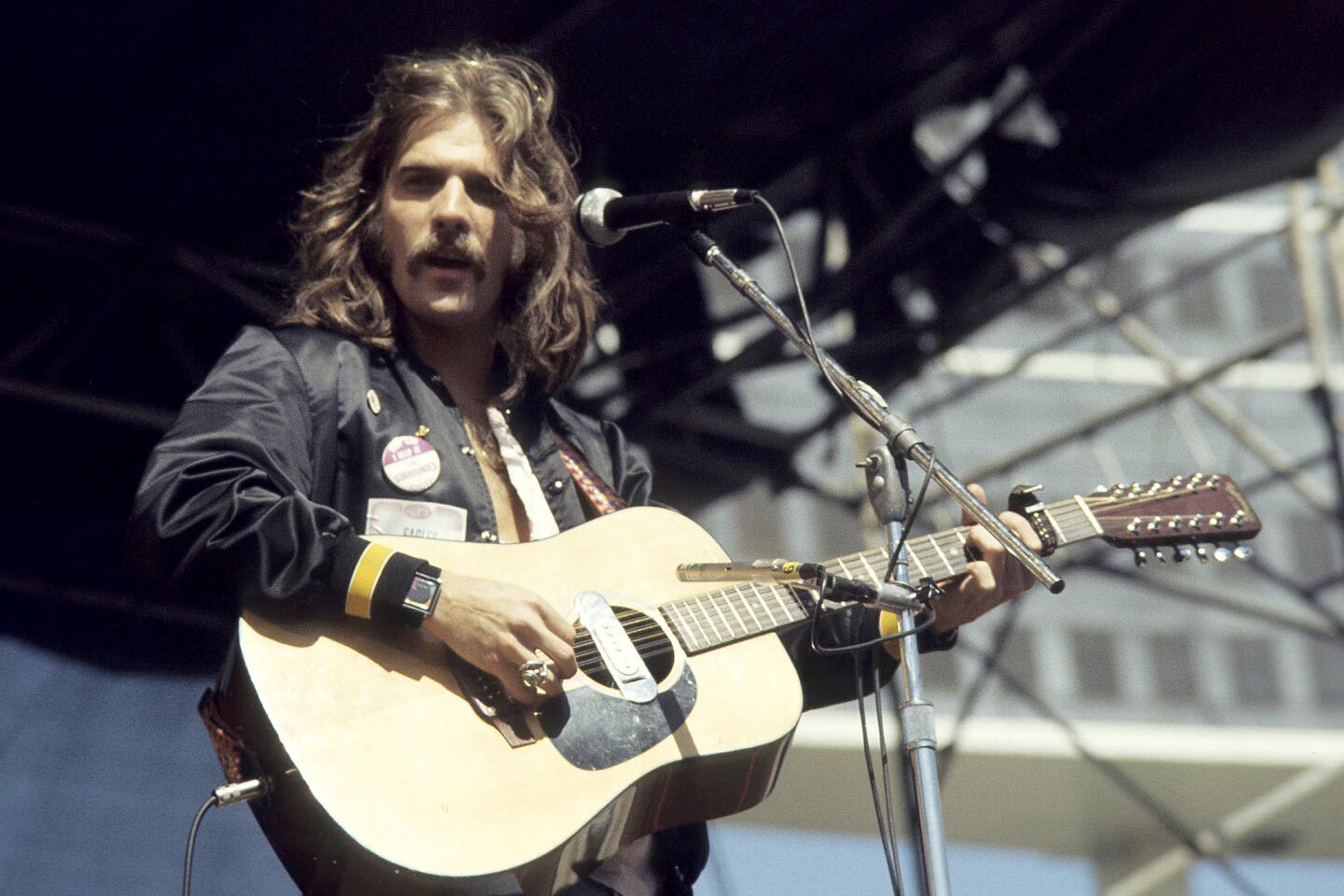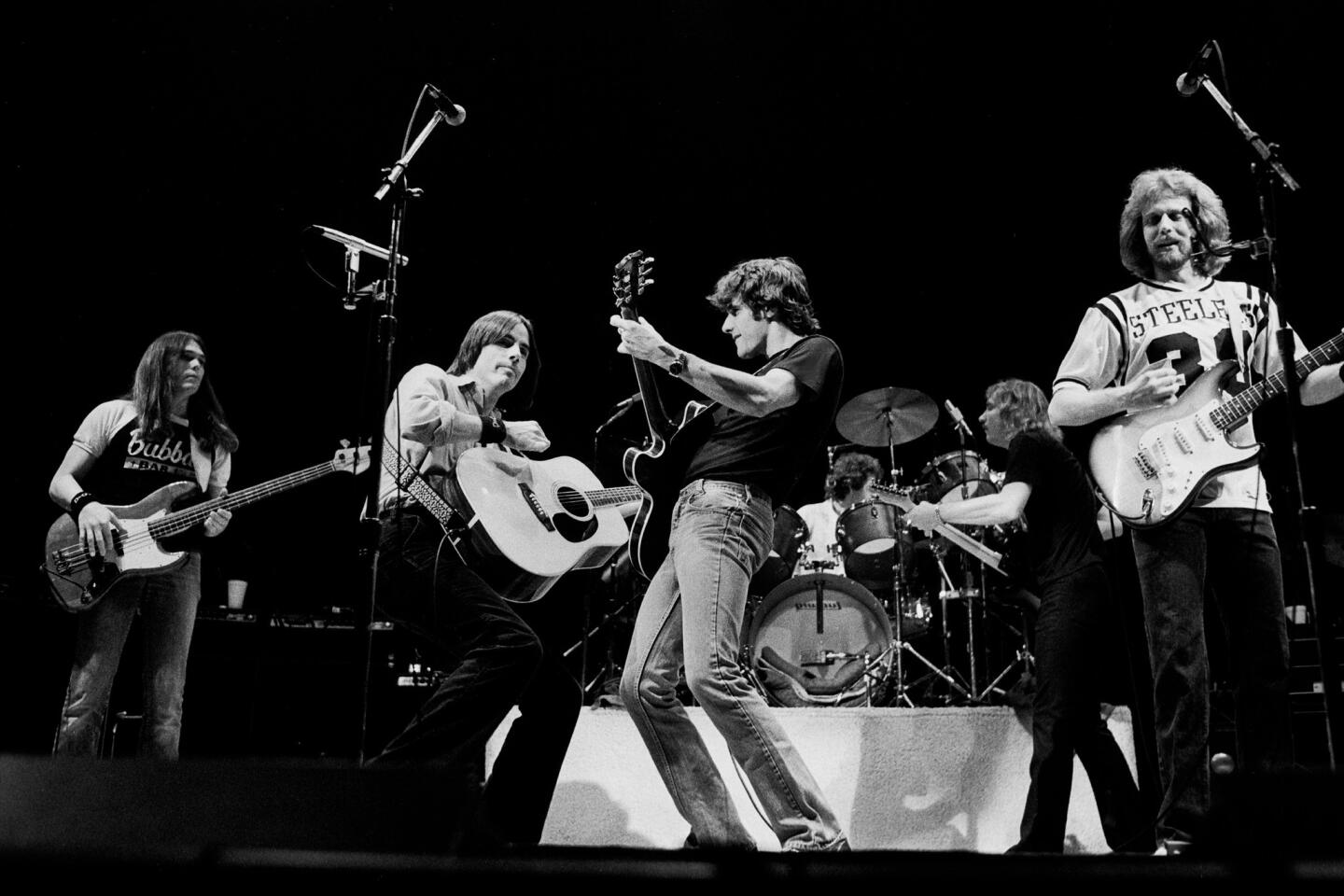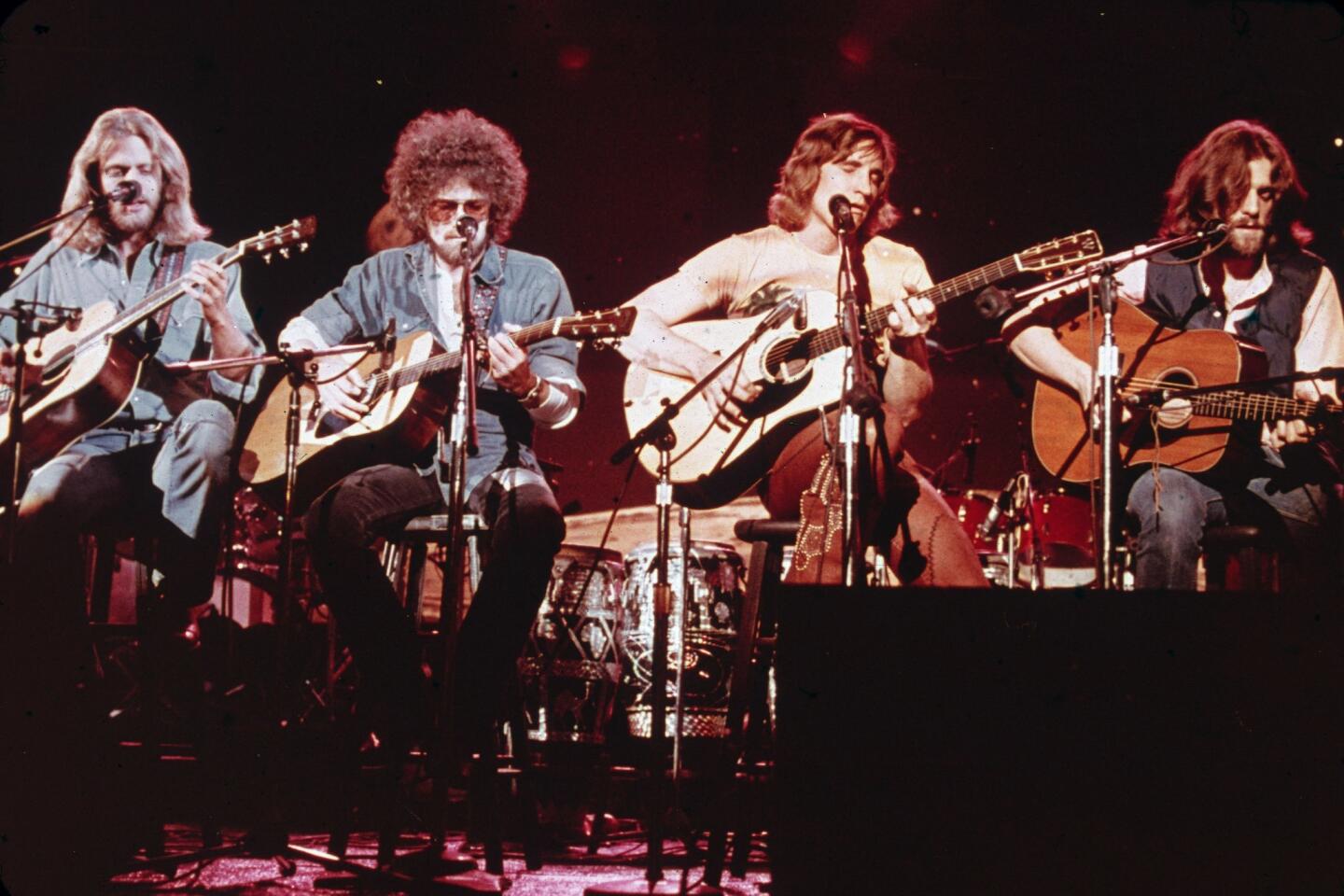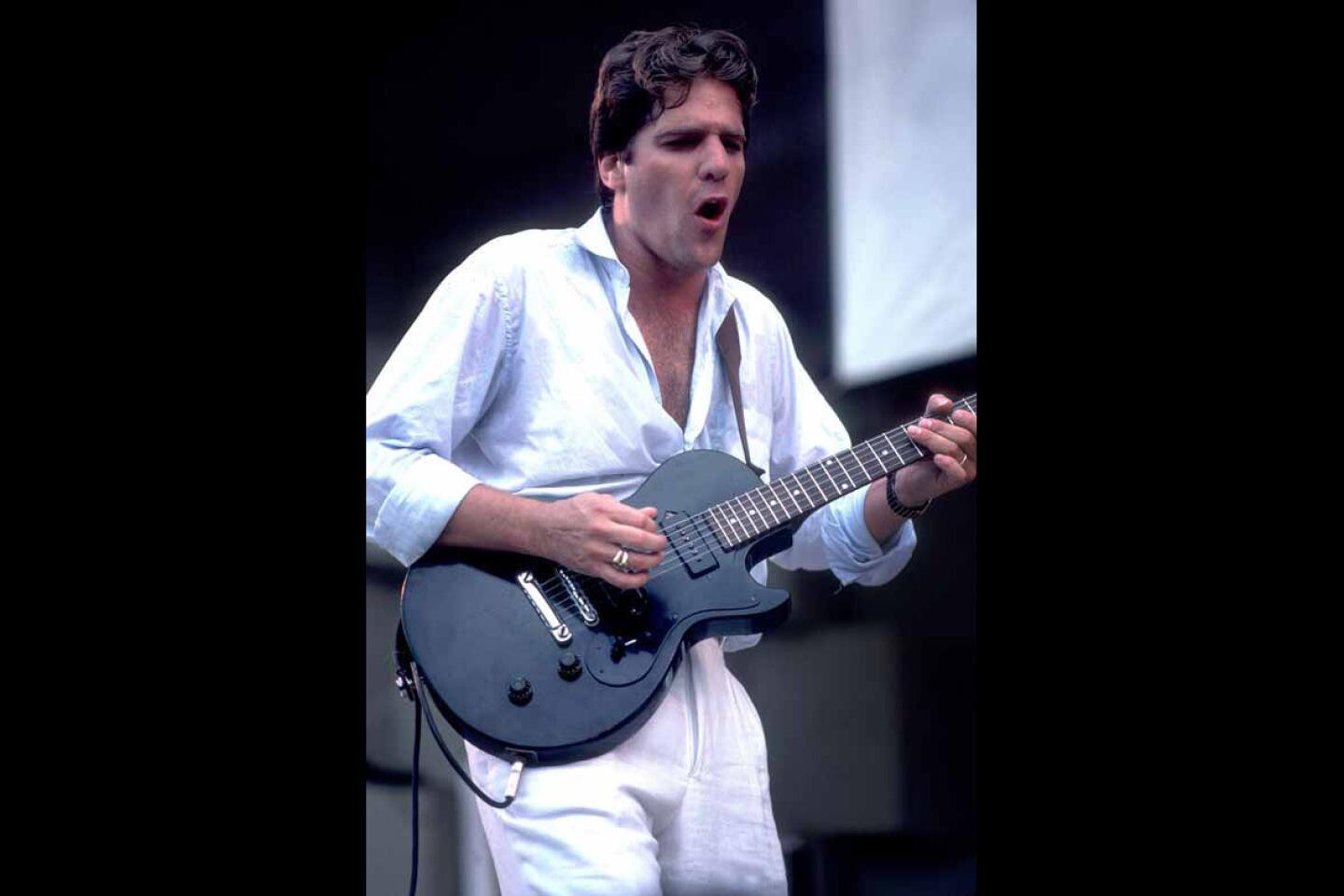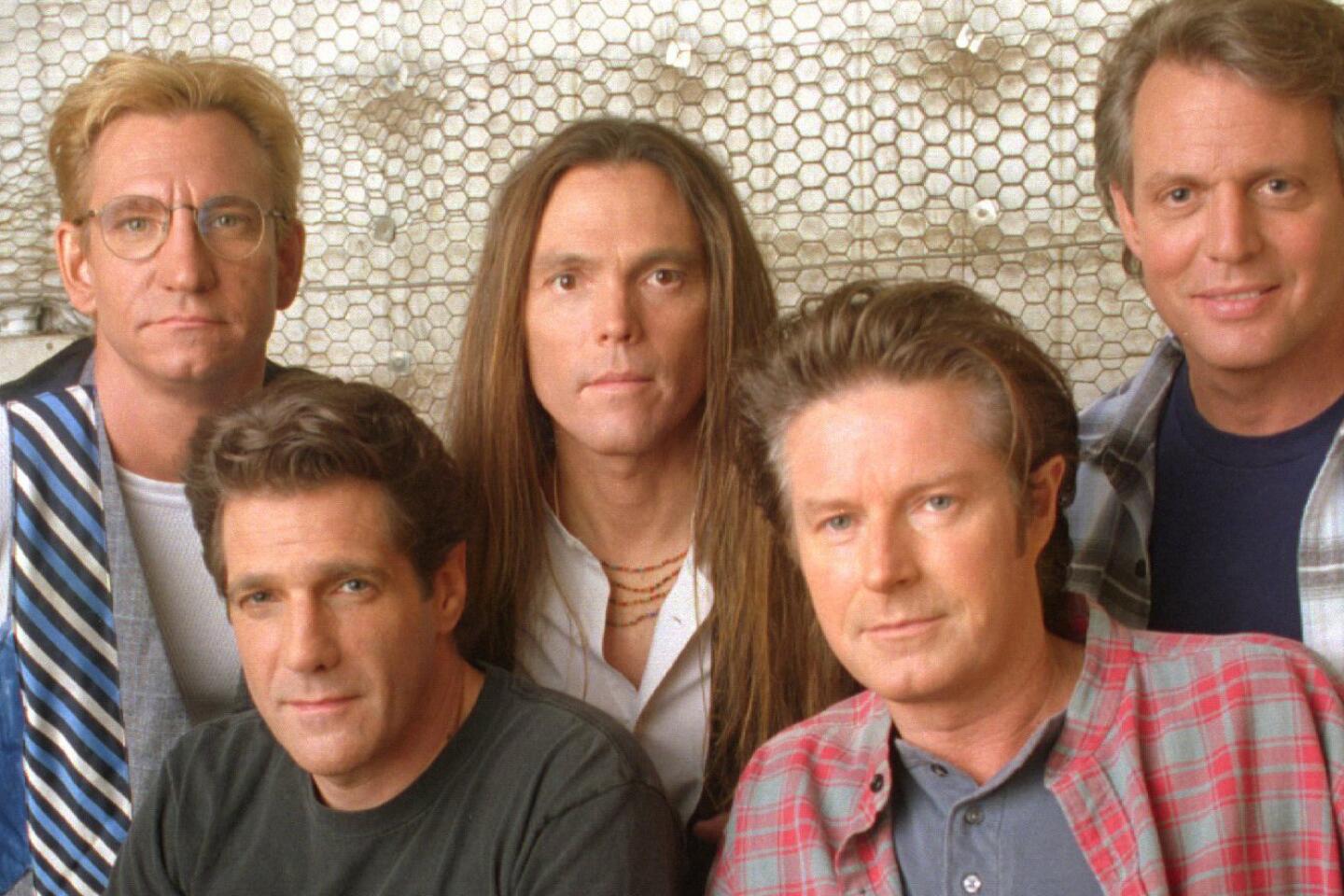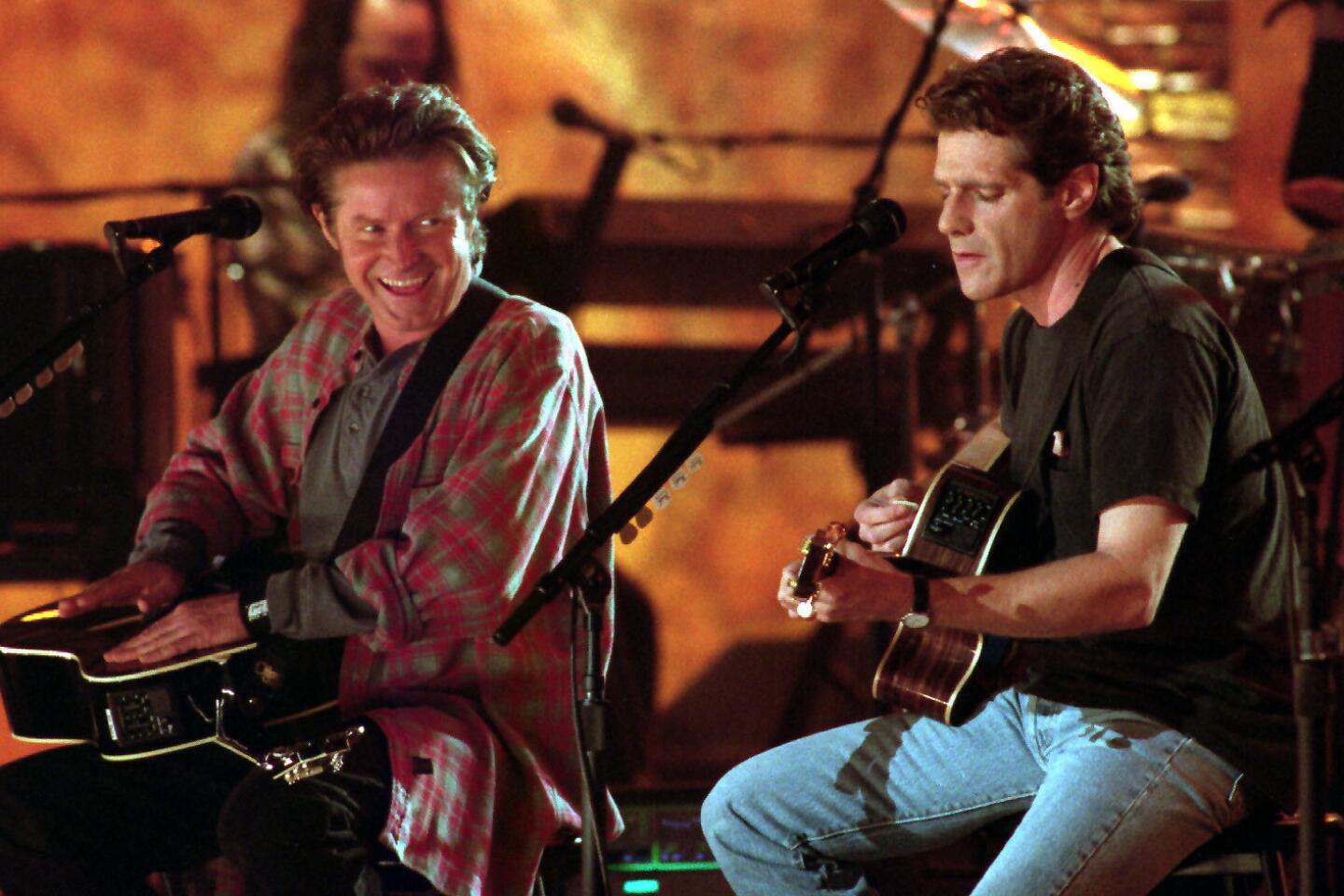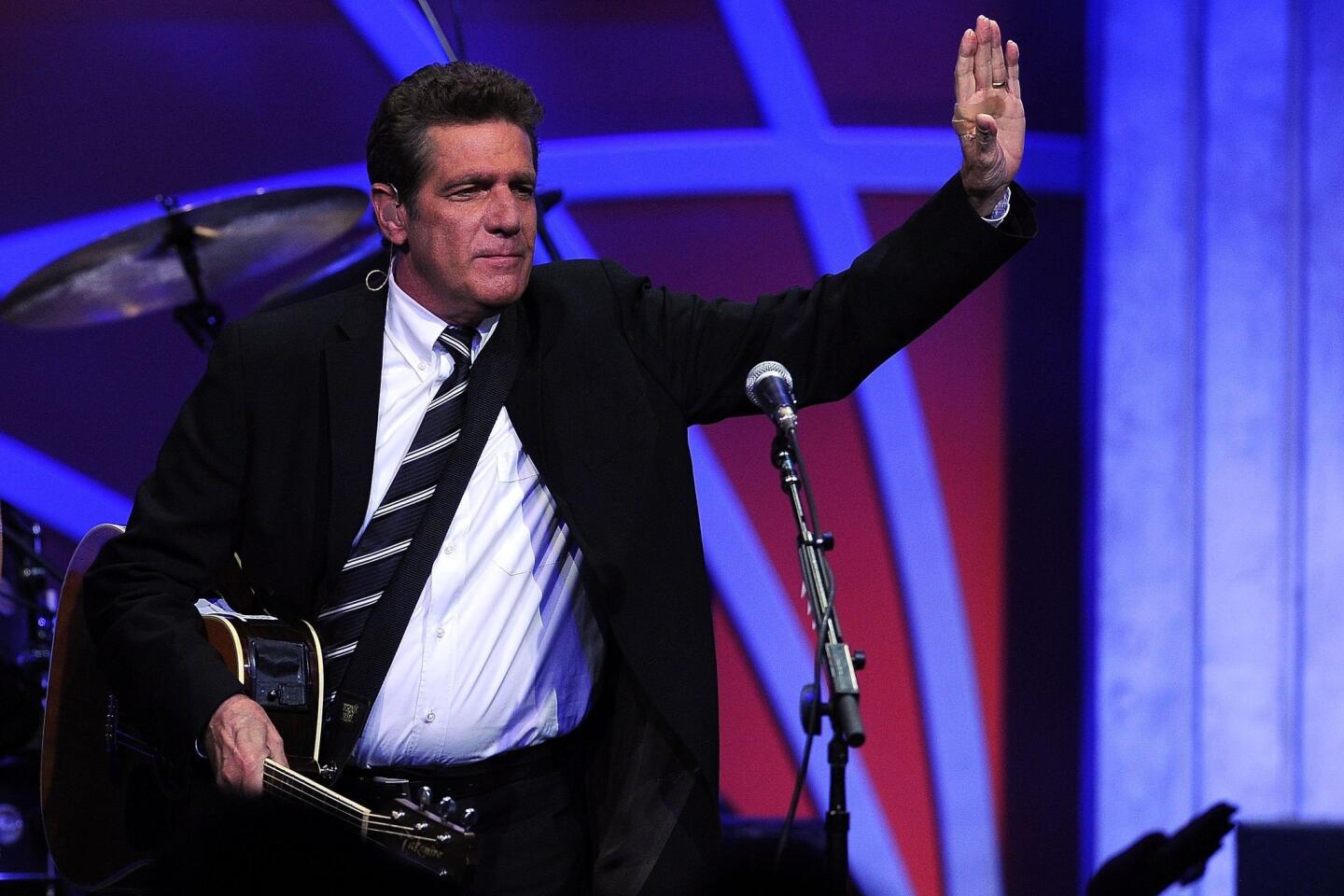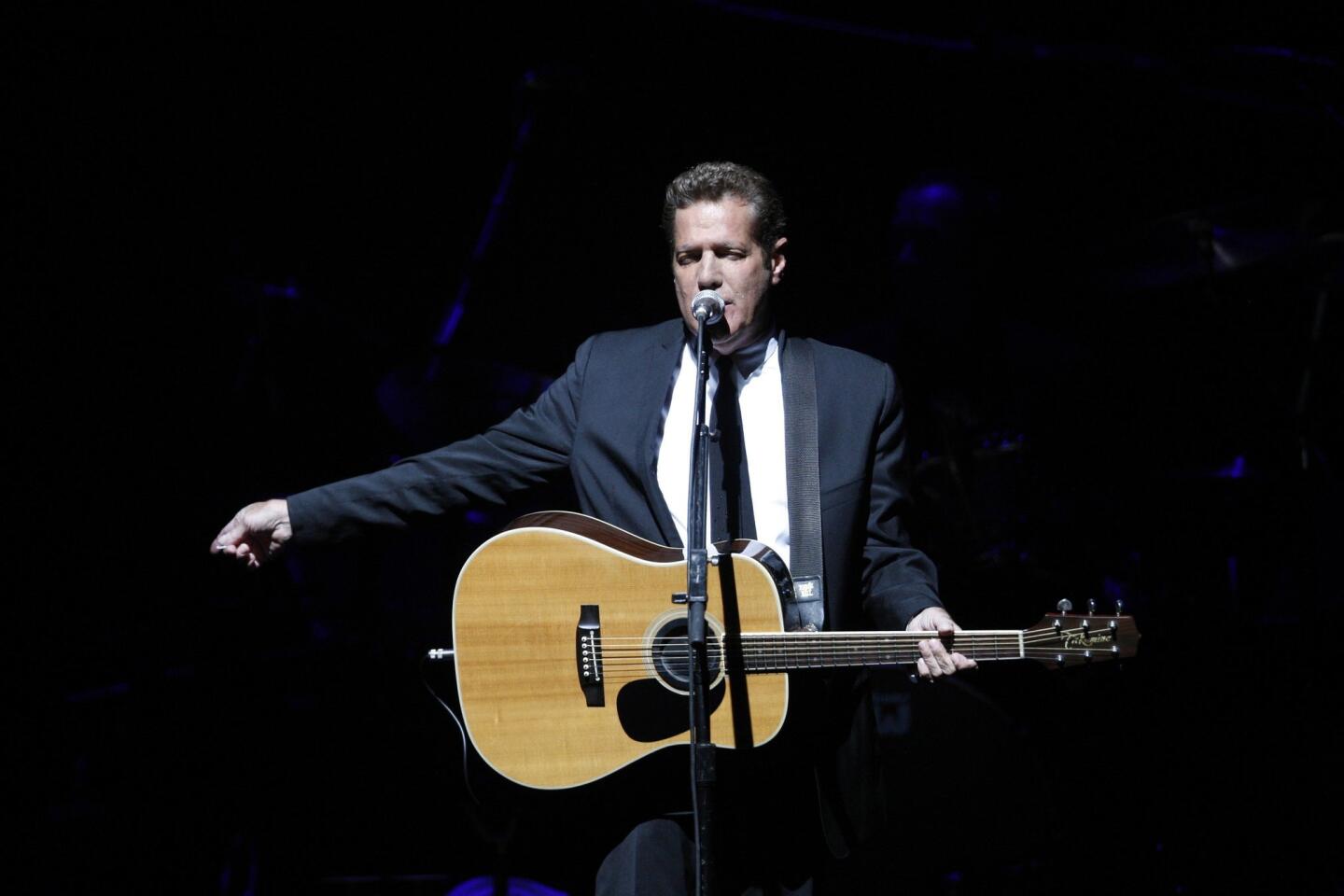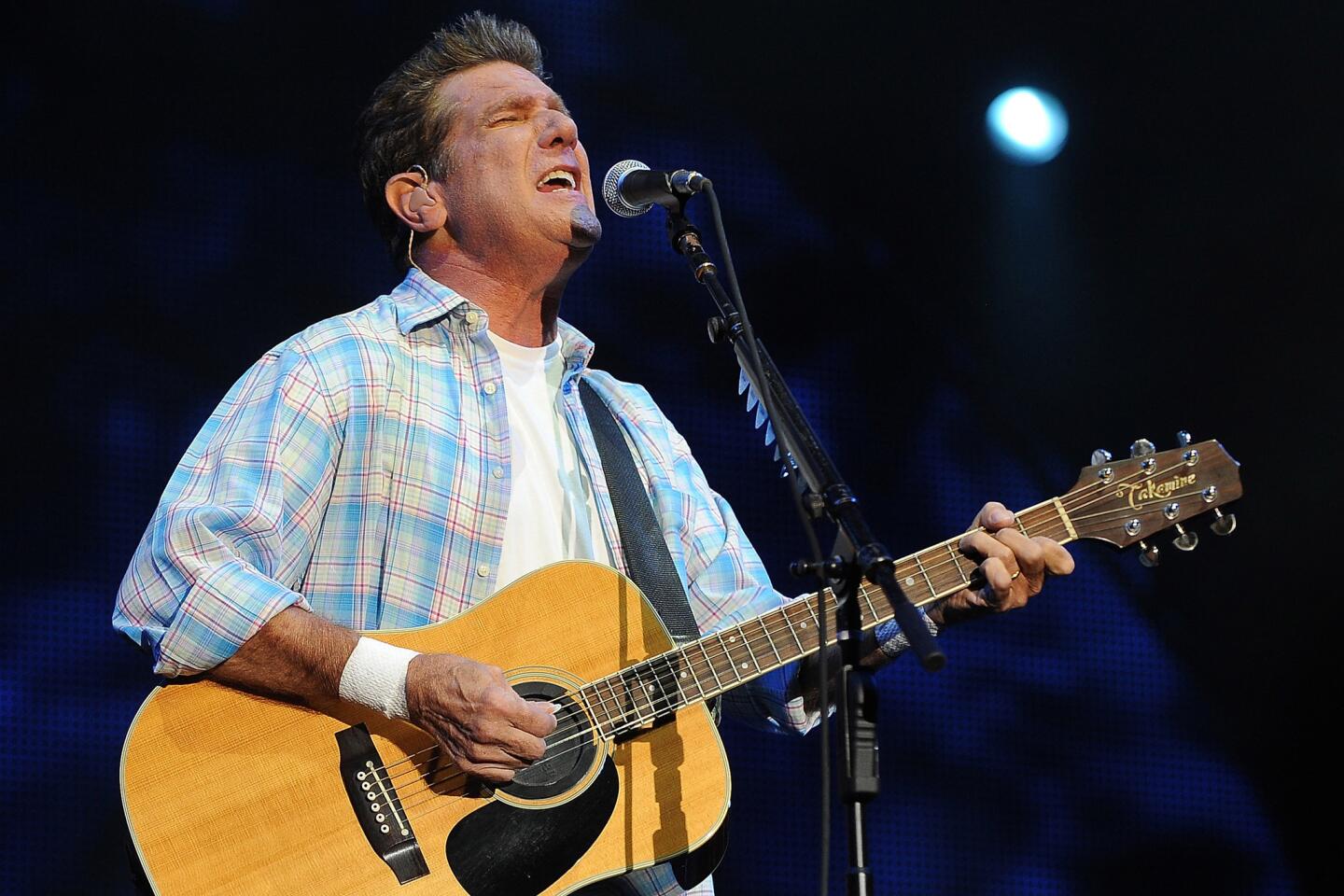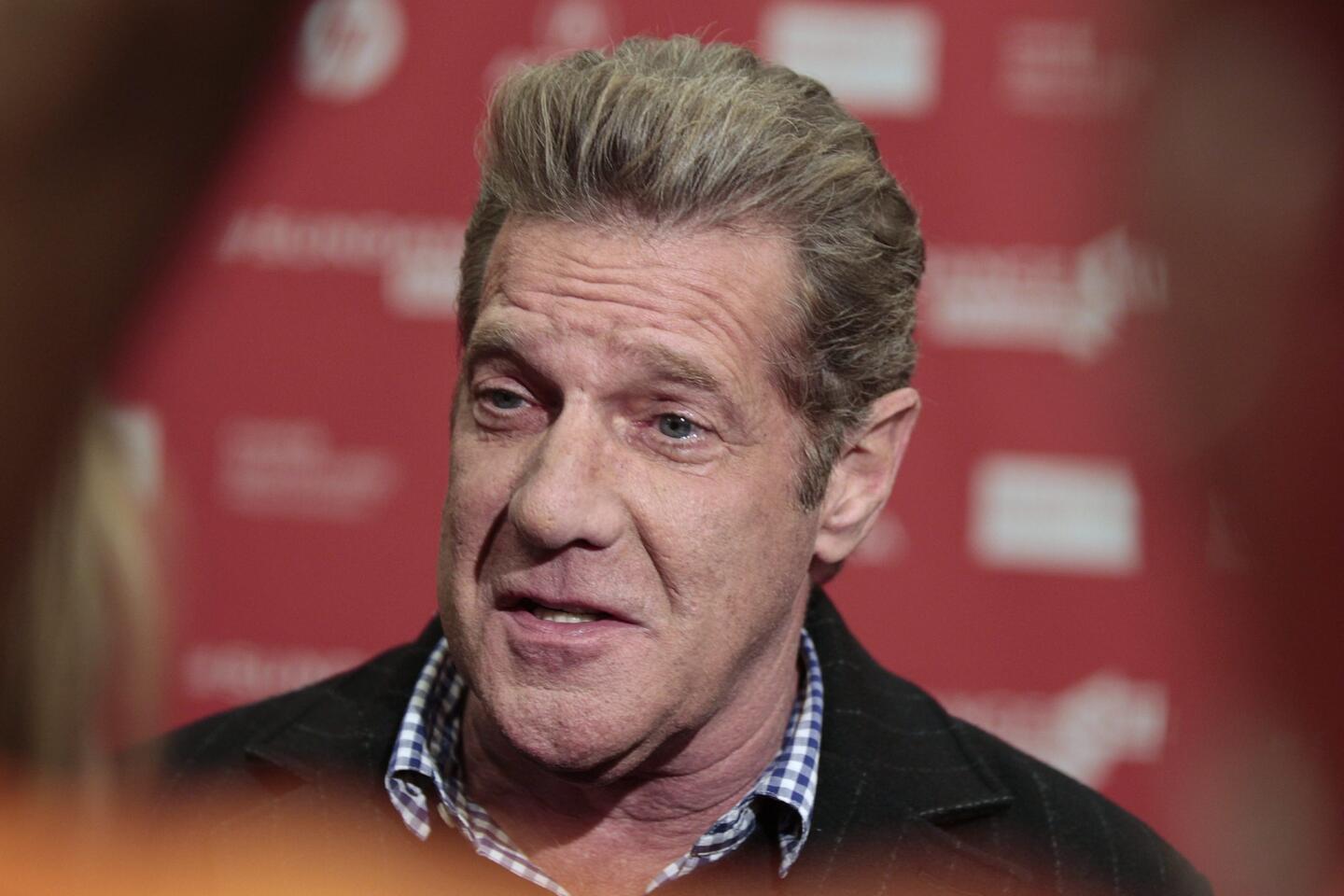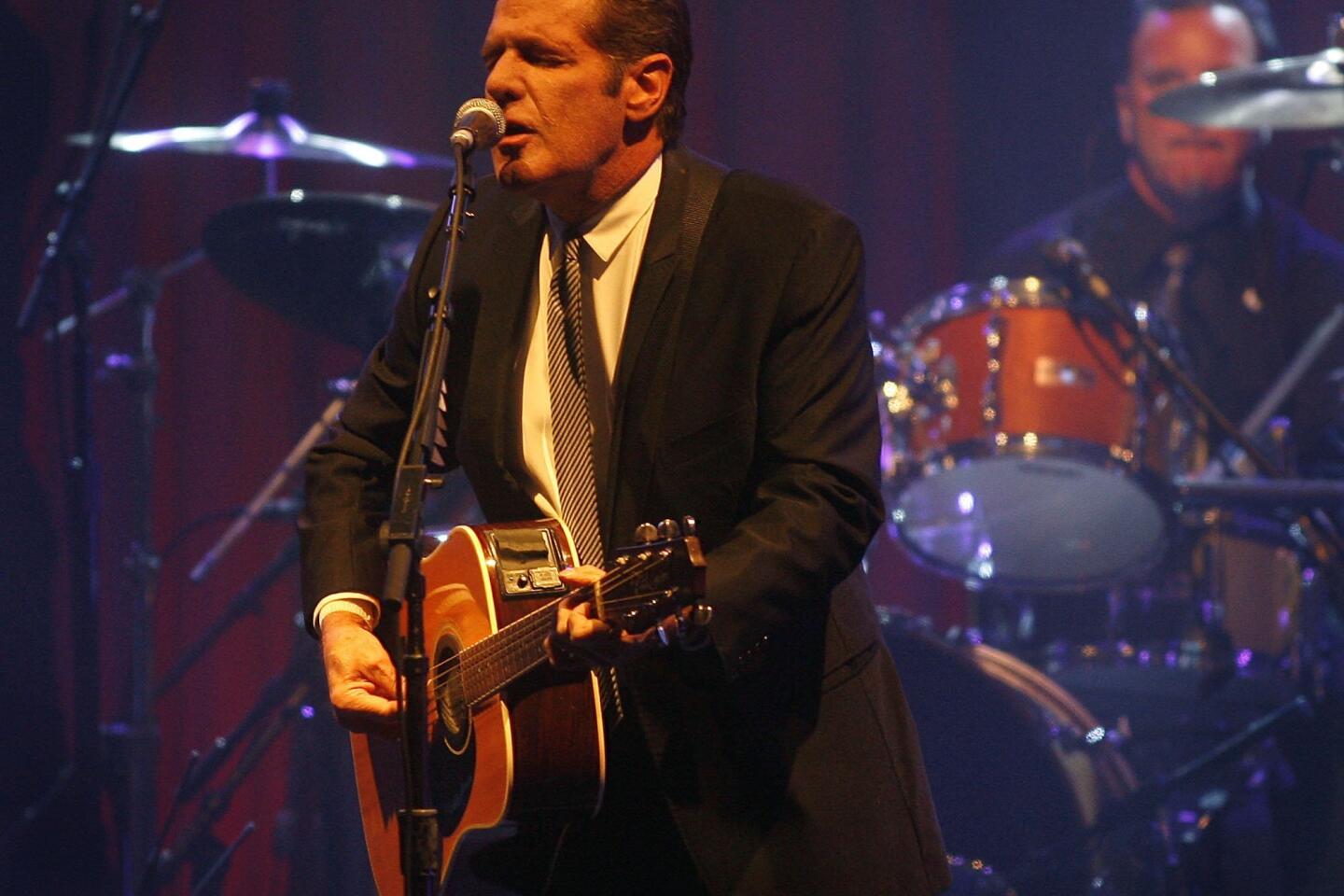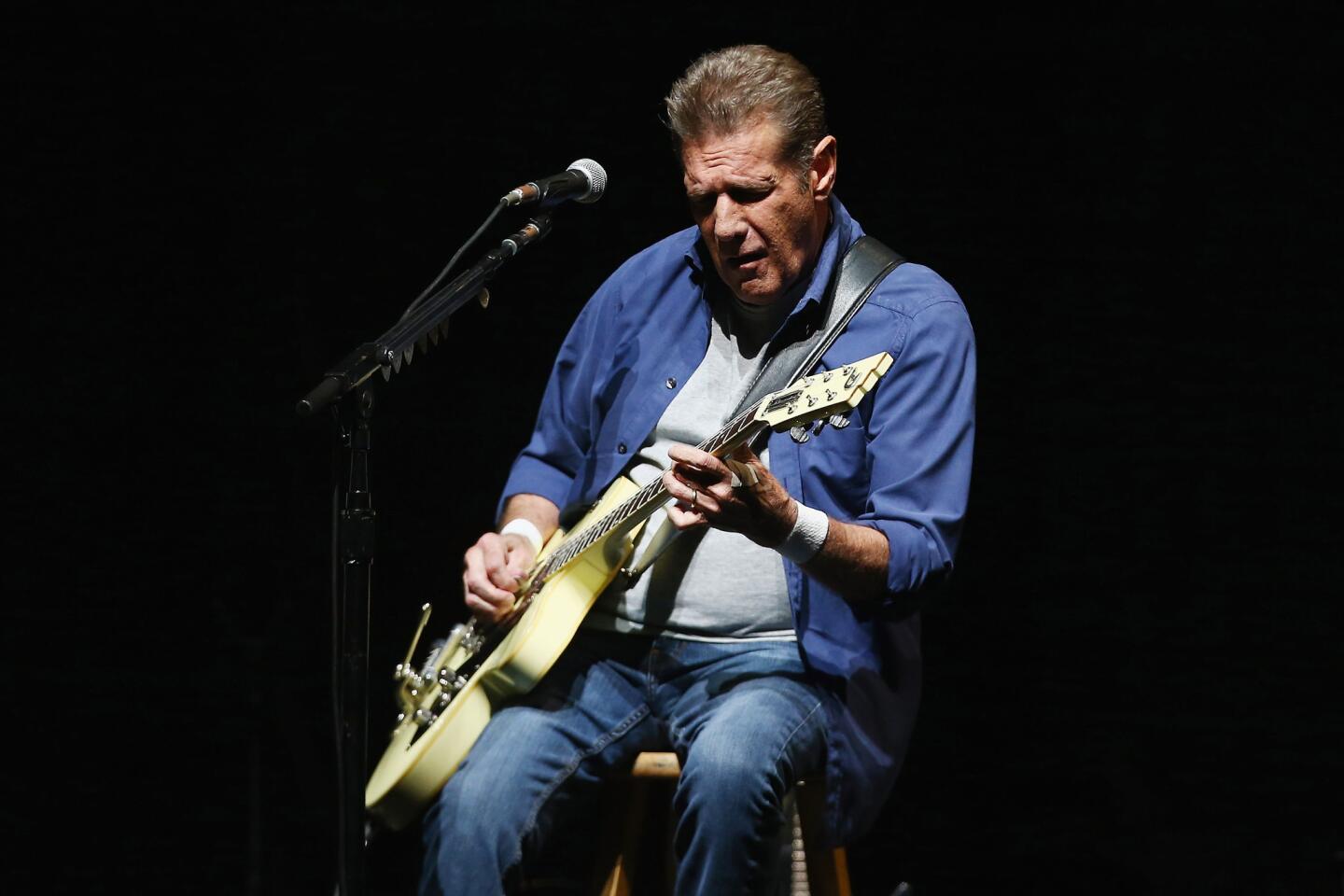Eagles guitarist Glenn Frey dies at 67: chief architect of band’s vocal and instrumental blend

Glenn Frey, center, performs with other Eagles band members in Los Angeles in 2008.
Glenn Frey grew up in Detroit, the town best known musically for the catchy R&B music that came out of Motown Records, and the home of hard-charging rock acts such as Bob Seger, Mitch Ryder & the Detroit Wheels and the MC5.
So when Frey turned up at the celebrated Troubadour nightclub in West Hollywood in the late 1960s to audition as a singer and guitarist for rising country-rock singer Linda Ronstadt, her manager wasn’t sure he’d be a good fit.
“I had pigeonholed him as this punky kid from Detroit who wanted to be a rocker,” John Boylan said Monday. “But he surprised me with the scope of his musical knowledge. The very first rehearsal we had with Linda, we were doing a [Hank Williams] song, ‘Lovesick Blues.’ He knew the country sixth chords that Hank would use — he knew the whole genre already. I figured I would have to teach this guy about ancient country music, but he could have taught me.”
Frey went on to become a founding member of the Eagles, one of the most successful bands of all time — a group that will be forever associated with the Southern California country rock sound.
Frey died in New York on Monday from the rheumatoid arthritis he’d struggled with for 15 years as well as acute ulcerative colitis and pneumonia.
“When they went on tour with me, it was the first time Glenn had ever gone on the road,” Ronstadt recalled Monday. “We didn’t have enough money for everyone to have their own rooms, so the guys had to double up. That’s when Glenn and Don [Henley] started working together. When they said they wanted to form a band of their own, I thought, ‘Hot dog! Yes, you should put a band together.’ The first time I heard them sing ‘Witchy Woman,’ I knew they were going to have hits.”
Join the conversation on Facebook >>
His death could spell the end of the Eagles, a group whose sound captivated listeners worldwide starting with their first No. 1 hit, “Best of My Love” in 1974, and continuing with such successes as “One of These Nights,” “Lyin’ Eyes,” “Take It to the Limit,” “New Kid in Town,” “Heartache Tonight,” “The Long Run,” and one that became a contemporary standard replayed nightly by bar bands around the world, “Hotel California.”
That song explored the darkness they found lurking beneath the bright promises of fame and fortune often dangled in front of musicians, actors and other artists who come to California in pursuit of their dreams.
Frey and band mate Don Henley wrote of the excesses they observed — and famously indulged in themselves — in and around Hollywood:
Mirrors on the ceiling,
The pink champagne on ice
And she said, “We are all just prisoners here, of our own device”
Besides reaching No. 1 on Billboard’s Hot 100 singles chart in 1977, “Hotel California” was subsequently honored with the Grammy Award for record of the year.

Glenn Frey - A collection of memorable songs.
In a statement issued Monday, Henley said Frey “was like a brother to me; we were family, and like most families, there was some dysfunction.”
That was a reference to the internal tensions the band was notorious for, and which led the group to disband at the end of the 1970s.
Henley had famously said the Eagles would reunite “when hell freezes over,” a phrase the band good-naturedly adopted when it did indeed get back together in 1992 for a new round of recordings and regular tours that continued into 2015.
“The bond we forged 45 years ago was never broken, even during the 14 years that the Eagles were dissolved,” Henley wrote. “We were two young men who made the pilgrimage to Los Angeles with the same dream: to make our mark in the music industry — and with perseverance, a deep love of music, our alliance with other great musicians and our manager, Irving Azoff, we built something that has lasted longer than anyone could have dreamed. But, Glenn was the one who started it all.”
Azoff, who has managed the Eagles for most of their long career, said Frey was as astute in business as he was in music.
“He was always telling people, ‘When you’re in the music business, you’ve got to have your music right, and you’ve got to have your business right,’” Azoff said Monday. “He had incredible instincts. He and Henley and I would always plot what was coming next. He wasn’t just an incredible writer, singer and musician.
“I don’t know of a better family man, or father. He’s just gone too soon.”
The Eagles were to have been recognized with a 2015 Kennedy Center Honor in December, but in November the band requested that it be put off until “all four Eagles — Glenn Frey, Don Henley, Joe Walsh and Timothy B. Schmit — can attend.”
At the time, Frey had a flare-up of intestinal problems he’d struggled with for years, Azoff said, and was hospitalized with plans for surgery. But he developed pneumonia and never was strong enough to undergo that procedure.
In 1986, Frey missed a reunion concert with Henley because of an intestinal disorder. An attempt to reunite the Eagles in 1990 was put off in part because of surgery to remove part of Frey’s intestine. And in 1994, their “Hell Freezes Over” reunion tour was interrupted by Frey’s bout with diverticulitis.
Frey and Henley collaborated on most of the Eagles’ signature songs, hits that came to define a quintessential Southern California pop sound in the 1970s, as distinctive as the Beach Boys’ sunny harmonies had been a decade earlier.
Frey and Henley, originally joined in the Eagles by Bernie Leadon and Randy Meisner, brought the two-, three- and four-part harmonies characteristic of country and bluegrass music to rock, powering them with electric guitars and drums in a tradition that had started with the Byrds, Buffalo Springfield and the Flying Burrito Brothers.
Henley credited Frey for being the chief architect of the vocal and instrumental blend that defined the Eagles.
“We gave Glenn a nickname, the Lone Arranger,” Henley wrote in 2003. “He had a vision about how our voices could blend and how to arrange the vocals, and, in many cases, the tracks. He also had a knack for remembering and choosing good songs.”
Glenn Lewis Frey was born Nov. 6, 1948, in Detroit and was inspired by the Beatles to take up the guitar. He played in bar bands in the Motor City as a teenager, and for a time was part of rocker Bob Seger’s band.
But Frey had greater ambitions, and he went to California, drawn by the vibrant rock and country folk scene brewing in the mid- to late 1960s.
The Troubadour was a focal point of that musical community, and it is where Frey met Ronstadt through mutual friend and musician J.D. Souther.
Frey and Souther formed a folk-based band called Longbranch Pennywhistle that began to make a name for itself, and for a time they shared an apartment in Echo Park, living above yet another soon-to-be-prominent singer-songwriter: Jackson Browne.
Frey said it was Browne who taught him the discipline needed to become a first-rate writer.
“He had his piano and guitars down there,” Frey wrote in the liner notes for the Eagles’ 2003 compilation album “The Very Best of the Eagles.” “I didn’t really know how to sit down and work on a song until I heard him playing underneath us in the basement.
“I had never really witnessed that sort of focus — someone being that fastidious — and it gave me a different idea about how to write songs; that maybe it wasn’t all just going to be a flood of inspiration. That’s when I first heard ‘Take It Easy,’” a song Frey helped Browne finish and which became the Eagles’ first national hit, in 1972.
While becoming one of the most successful acts in pop music, the Eagles also had detractors who criticized the band’s often ultra-polished sound as soulless and excessively calculated.
But fans continued to lap up the band’s recordings and concert tickets. The group’s 1976 compilation album, “Eagles/Their Greatest Hits 1971-1975,” is the second-biggest-selling album of all time, according to the Recording Industry Assn. of America, the trade organization that bestows gold and platinum records.
SIGN UP for the free Classic Hollywood newsletter >>
It has alternated over the years at No. 1 and 2 with Michael Jackson’s “Thriller,” which holds the top spot with certified sales of more than 30 million copies, to more than 29 million for the Eagles’ album.
During the band’s hiatus in the 1980s, Frey released three solo albums and ultimately logged 13 singles that made the Billboard Hot 100. Two of those peaked at No. 2: “The Heat Is On” (featured in the Eddie Murphy comedy “Beverly Hills Cop”) and “You Belong to the City.”
He also mapped out a second career as an actor, appearing in “Miami Vice” and other TV shows and starring in the short-lived 1993 series “South of Sunset.”
But it was with the Eagles that his reputation largely rested. After the group reunited in 1994, its tours generated bigger business at the box office than the group had in the 1970s, in large part because of the dramatic increase in the price of concert tickets over the decades.
The band commissioned a “History of the Eagles” documentary that aired on Showtime in 2013, and it recounted the light and the dark aspects of the group’s track record, including Frey and Henley’s decision to fire guitarist Don Felder, who had composed the signature guitar parts that help define “Hotel California.”
The documentary set the stage for a “History of the Eagles” concert tour that surveyed the group’s four decades of music-making and ranked No. 8 among the highest-grossing tours of the year worldwide, raking in $86.5 million in 2014, according to the concert industry-tracking magazine Pollstar.
As part of that tour, the Eagles played six sold-out shows at the newly renovated Forum in Inglewood at the outset of 2014.
Whether the Eagles could continue without Frey was a question no one was prepared to address Monday.
“I haven’t even given it a thought,” Azoff said. “It’s of no importance right now.”
Frey is survived by his wife, Cindy, and their children Taylor, Deacon and Otis.
“There will be a major memorial, and it will be in L.A.,” Azoff said. “The only thing the family and guys in the band ask is that we want to plan it right.”
Follow @RandyLewis2 on Twitter.
ALSO
Netflix: The most feared force in Hollywood?
David Bowie, transformative musician and multi-dimensional artist, dies at 69
‘American Pie’ singer Don McLean is arrested on suspicion of domestic violence
Spike Lee and Jada Pinkett Smith: Why you won’t see us at the Oscars
More to Read
The biggest entertainment stories
Get our big stories about Hollywood, film, television, music, arts, culture and more right in your inbox as soon as they publish.
You may occasionally receive promotional content from the Los Angeles Times.
